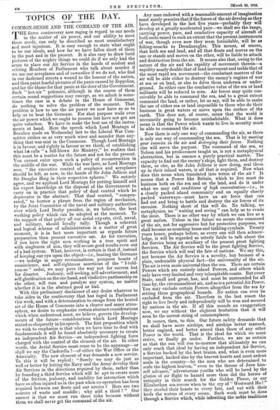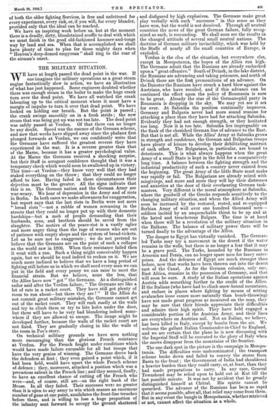TOPICS OF THE DAY.
■ •■•■19■••■••
COMMON-SENSE AND THE COMMAND OF THE AIR. THE fierce controversy now raging in regard to our needs in the matter of air power, and our ability to meet those needs, can only be described as most unsatisfactory and most injurious. It is easy enough to state what ought to be our ideals, and how far we have fallen short of them in the past and in the present. It is also easy to draw lurid pictures of the mighty things we could do if we only had the sense to place our Air Service in the hands of modest and retiring Members of Parliament who talk about murder if we use our aeroplanes and of cowardice if we do not, who find in our darkened streets a wound to the honour of the nation, and then paint fearful pictures of the panic caused by Zeppelins, and lay the blame for that panic at the door of the Government. Such " hot-air " polemics, although in the course of them certain sound suggestions may emerge, as we admit is some- times the case in a debate in the House of Commons, do nothing to solve the problem of the moment. That problem is how to use the air power we now have so as to help us to beat the Germans. For .that purpose wails over the air power which we ought to possess but have not got are quite valueless. We have to make the best use of the instru- ments at hand. Here the speech which Lord Montagu of Beaulieu made on Wednesday last to the Liberal War Com- mittee strikes us as very much wiser and sounder than any- thing that was said in the Commons. Though Lord Montagu is in favour, and rightly in favour as we think, of establishing what Le calls "a full-blown Air Ministry," he realizes that this must be a matter for the future and not for the present. You cannot enter upon such a policy of reconstruction in the middle of the war. While the war lasts, as Lord Montagu sees, " the executive control of seaplanes and aeroplanes should be left, as now, in the hands of Sir John Jellicoe and Sir Douglas Haig in their respective spheres." We entirely agree, and we applaud Lord Montagu for putting himself and his expert knowledge at the disposal of the Government to carry on in practice that policy of dual control which he deprecates in the abstract. That dual control, " compen- sated," to borrow a phrase from the region of mechanics, by the Joint Committee of the naval and military authorities over which Lord Derby presides, is, we believe, the best working policy which can be adopted at the moment. To the support of that policy all our aerial experts, civil, naval, and military, should loyally rally. Though a coherent and logical scheme of administration is a matter of great moment, it is in fact more important as regards future preparation than resent executive use. As for execution, if you have the right men working in a true spirit and with singleness of aim, they will secure good results even out of a bad system. What, however, is certain is that if, instead of keeping our eye upon the object—i.e., beating the Germans —we indulge in angry recriminations, pompous boasts of omniscience, and self-righteous assertions of the " I-told- you-so " order, we may pave the way not for success but for disaster. Jealousy, self-seeking, self-advertisement, and self-glorification on the one hand, and vindictive partisanship on the other, will ruin and paralyse any system, no matter whether it is in the abstract good or bad.
With this preliminary disclaimer of any desire whatever to take sides in the controversy that has raged in Parliament this week, and with a determination to escape from the heated air of the House of Commons into a clearer and saner atmo- sphere, we desire to emphasize certain abstract considerations which when understood must, we believe, govern the develop- ments of the future—considerations which Lord Montagu stated so eloquently in his speech. The first proposition which we wish to emphasize is that when we have time to deal with fundamentals it will be found absolutely necessary to create an independent Air Service—an independent fighting force charged with the control of the element of the air. In other words, the Aerial Service must cease to be the appanage—or shall we say the Cinderella ?—of either the War Office or the Admiralty. The new element of war demands a new service. To this it will be replied : "Surely we may do just as well or better by letting the Navy and the Army develop their Air Services in the directions required by them, rather than by founding a third Service which will be apt to create more of the friction, jealousy, and inability for interaction which have so often injured us in the past when co-operation has been required between our fleets and our armies ? Here are two sources of waste and muddle ; why add a third ? " Our answer is that we must run these risks because without them we shall never get the command of the air. Any man endowed with a reasonable amount of imagination must surely perceive that if the forces of the air develop as they have developed in the last five years—probably they will develop at a greatly accelerated pace—we shall see the range, carrying power, pace, and combative capacity of aircraft of both sorts raised to such an extent that the present instruments of war, though even now they seem formidable, will be as fishing-smacks to Dreadnoughts. This means, of course, that both sea and land, and all that floats and moves on the one or stands and moves on the other, will be liable to attack and destruction from the air. It means also that, owing to the nature of the air and the rapidity of movement therein—a rapidity nearly double that of land movement and treble that of the most rapid sea movement—the combatant masters of the air will be able either to destroy the enemy's engines of war at sea or on land, or else to drive them undersea or under- ground. In either case the combative value of the sea or land militants will be reduced to zero. Air forces may quite con- ceivably be able to command the sea, and to a great extent command the land, or rather, let us say, will be able to make the use of either sea or land impossible to those who do their business in great waters or move upon the surface of the earth. This does not, of course, mean that the world is necessarily going to become uninhabitable. What it does mean is that the Power which wants to live in security must be able to command the air.
Now there is only one way of commanding the air, as there is only one way of commanding the sea. That is by meeting your enemies in the air and destroying their forces. Nothing else will serve the purpose. The command of the sea, as Nelson and his predecessors taught us, is not a metaphysical abstraction, but in essence a purely practical matter. The capacity to find out the enemy's ships, fight them, and destroy them, or else, as Sir John Jellicoe is now doing, seal them up in their inland waters, is all that is required. Now what does this mean when translated into terms of the air ? It means that a Power like Britain, which to live must do business both on the sea and on the land, and do it under what we may call conditions of high concentration—i.e., in a closely packed island community and on equally closely packed waterways—must have an air force that can find out and bring to battle and destroy the air forces of its enemies. Nothing short of this will do. No talking, no metaphysics, no " waiting and seeing " can help us to evade the issue. There is no other way by which we can live as a great nation. Unless in the future we secure the command of the air, not for aggressive but for protective purposes, we shall become as sounding brass and tinkling cymbals. Twenty years hence, perhaps before, as every one will then acknow- ledge, it will be regarded as utterly futile to talk about the Air Service being an auxiliary of the present great fighting Services. The Air Service will be the great fighting Service, the Service which will seal the fate of nations. We say this, not because the Air Service is a novelty, but because of a plain, undeniable physical fact—the universality of the air. The air is even more universal than the sea. There are certain Powers which are entirely inland Powers, and others which only have very limited and very inhospitable coasts. But every State, small and great, has, and must be surrounded for all time by, the circumambient air, and so is a potential Air Power. You may exclude certain Powers altogether from the sea by setting them geographical bounds. No nation can ever be excluded from the air. Therefore in the last resort the right to live freely and independently will be won and secured by nations in the air. If all this sounds an exaggeration now, we say without the slightest hesitation that it will soon be the merest string of commonplaces.
It comes, then, to this. Our future safety demands that we shall have more airships, and airships better manned, better engined, and better armed than those of any other Power in the world. That is the ideal for which we must strive, or finally go under. Further, we are as certain as that the sun will rise to-morrow that ultimately we can only reach that ideal by having an independent Air Service, a Service backed by the best brains, and, what is even more important, backed also by the bravest hearts and most ardent souls in the country—by the men who are determined to scale the highest heaven, even to the throne of Jove him- self advance," adventurous youths who will be lured by the glories of air flight to hazard more than did the heroes of antiquity in their search for the Golden Fleece, or. our Elizabethan sea-rovers when to the cry of " Westward Ho I " they steeled their hearts to every fate, and cut with their keels the waters of every ocean. Such work must be done through a Service which, while inheriting the noble traditions of both the older fighting Services, is free and unfettered for every experiment, every risk, or, if you will, for every blunder, provided only that the ideal can be reached. We have an inspiring work before us, but at the moment there is a deadly, dirty, bloodstained scuffle to deal with which we must finish in the good. old-fashioned hammer-and-tongs way by land and sea. When that is accomplished we shall have plenty of time to plan for those mighty days when " Heaven's deep-domed empyrean " shall ring to the roar of the airman's onset.



























 Previous page
Previous page